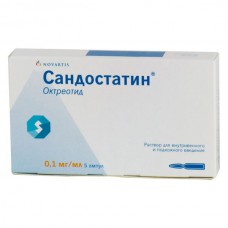Expiration date: 09/2026
The composition and form of issue:
1 vial of 1 ml solution for injection contains octreotide (as free peptide) of 0.05, 0.1 or 0.5 mg in a package 5 PCs
Pharmacological action:
Inhibits the increased secretion of growth hormone, as well as liberatiou of peptides and serotonin produced in gastroenteropancreatic endocrine system.
Indications:
Acromegaly (the ineffectiveness or impossibility of carrying out surgical treatment, radiation therapy or treatment with dopamine agonists) endocrine tumors gastroenteropancreatic system (relief of symptoms carcinoid tumors with symptoms of carcinoid syndrome, the tumors are characterized by hyperproduction of vasoactive intestinal peptide) glucagonoma gastrinoma (syndrome zollingerellison), insuloma, Vipoma tumor characterized by hyperproduction somatoliberina refractory diarrhea in AIDS patients, surgery on the pancreas (prevention of complications) bleeding (including relapse prevention) for varicose veins of the esophagus and stomach in patients with liver cirrhosis (emergency treatment).
Contraindications:
Hypersensitivity.
Application of pregnancy and breast-feeding:
Care should be taken.
Side effects:
Nausea, vomiting, anorexia, spasticskie pains in the abdomen, feeling of bloating, flatulence, loose stools, diarrhea and steatorrhea, symptoms of acute intestinal obstruction (progressive abdominal distension, severe epigastric pain, tenderness and tension of the abdominal wall on palpation) violation of function of a liver formation of gallstones (during long-term use), acute pancreatitis, impaired postelementary glucose tolerance, hyperglycemia, hypoglycemia, hair loss. In the injection — pain, itching or burning sensation, redness and swelling.
Drug interactions:
Slows the absorption of cimetidine, cyclosporine.
Method of application and dose:
In acromegalic patients and tumors gastroenteropancreatic system, n/a — 0.05–1 mg 1-2 times daily if needed dose can be gradually increased to 0.1–0.2 mg 3 times a day refractory diarrhea in AIDS, n/a, 0.1 mg 3 times a day, may gradual increase in dose to 0.25 mg 3 times a day. To prevent complications after surgery on the pancreas the first dose of 0.1 mg enter n/a for 1 h before laparotomy then after the operation, p/K — 0.1 mg 3 times a day for seven consecutive days. To stop bleeding from varicose veins of the esophagus or the stomach is administered at 25 µg/h by continuous I/V infusion for 5 days.
Precautions:
The drug solution should be at room temperature. Gastroenteropancreatic in the treatment of endocrine tumors in rare cases, there can be a sudden relapse of symptoms. In patients with insulinoma treatment may increase the severity and duration of hypoglycemia. Significant fluctuations in the concentration of glucose in the blood can be reduced by the introduction of more frequent smaller doses. Patients receiving insulin may decrease the need for it. Bleeding from esophageal varices in patients with liver cirrhosis increases the risk of diabetes insulinnezavisimogo or change the need for insulin in the existing diabetes therefore requires systematic monitoring concentrations of glucose in the blood.


